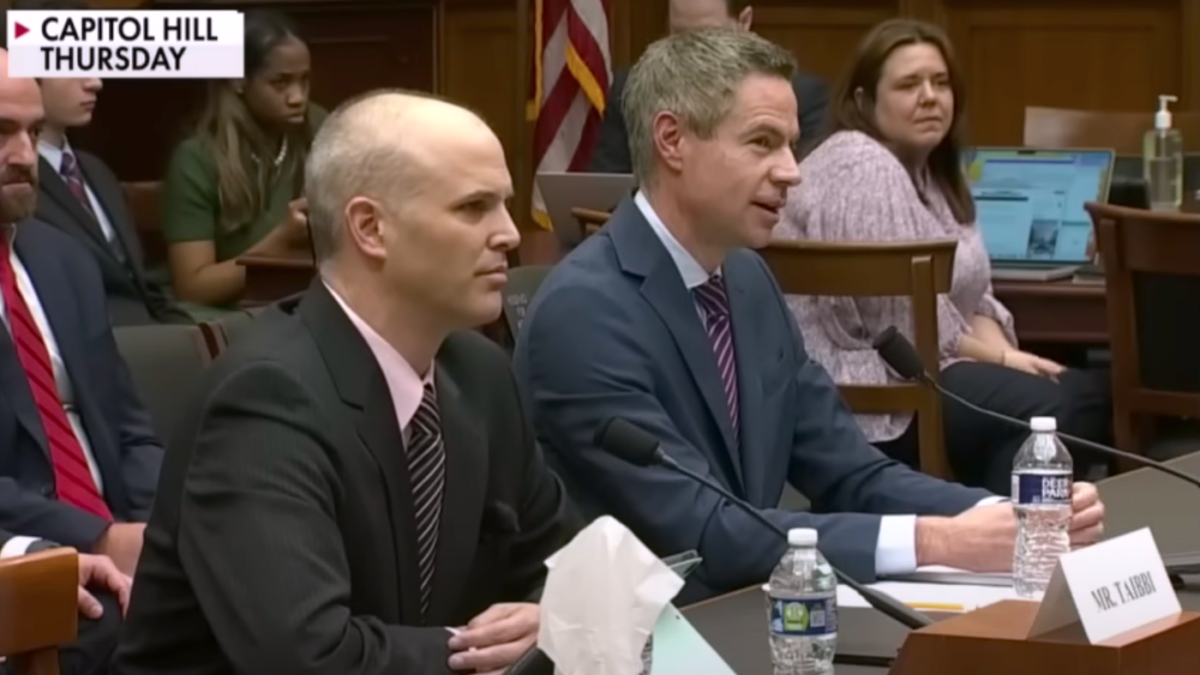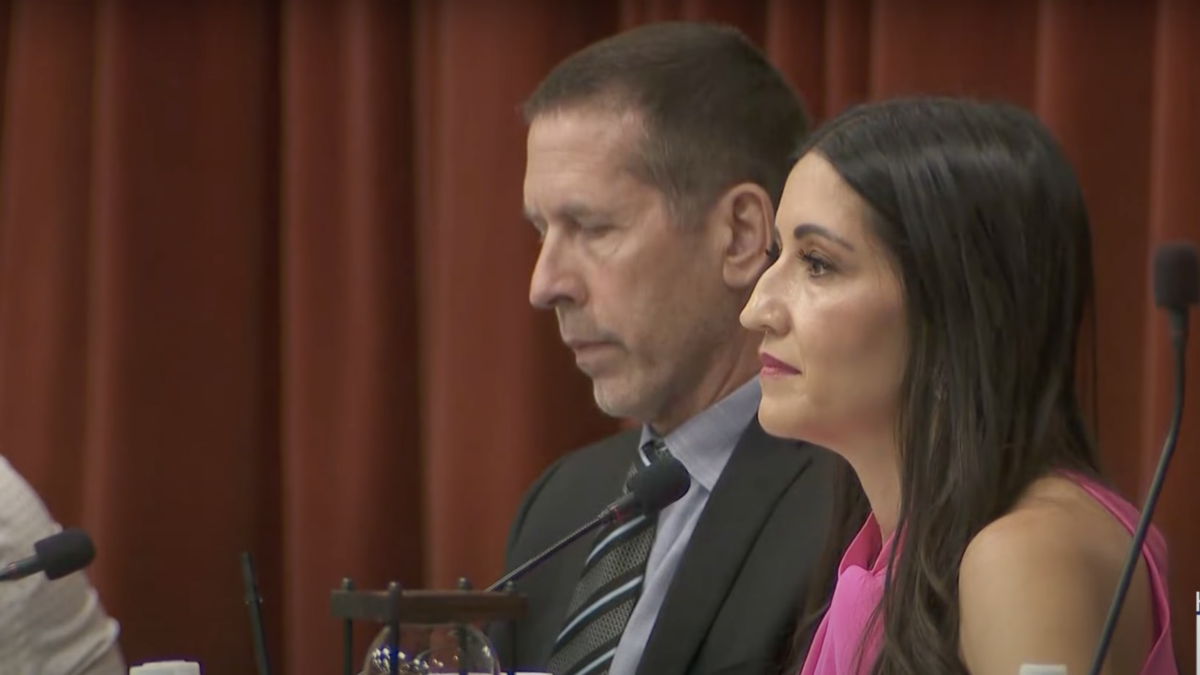The media-ratings giant NewsGuard denied it was “government-funded” after being called out as part of the vast Censorship Complex during congressional hearings last week. But government records and the company’s own public announcement celebrating a nearly $750,000 federal grant suggest otherwise.
On Thursday, independent journalists Matt Taibbi and Michael Shellenberger appeared before the House Subcommittee on the Weaponization of the Federal Government to testify about what they had discovered during a review of internal Twitter communications. An hour before the weird hearing began, Taibbi released the latest installment of the “Twitter Files.”
Halfway through his thread, titled “The Censorship-Industrial Complex,” Taibbi wrote: “Some NGOs, like the GEC-funded Global Disinformation Index or the DOD-funded NewsGuard, not only see content moderation but apply subjective ‘risk’ or ‘reliability’ scores to media outlets, which can result in a reduction in revenue.” Embedded in the post was a picture of a nearly $750,000 award from the Department of Defense to NewsGuard, an organization the independent journalists characterized as a “government-funded” entity implicated in the Censorship Complex.
In response to Republican Rep. Matt Gaetz’s question — “Who is NewsGuard?” — Shellenberger explained: “Both the Global Disinformation Index and NewsGuard are U.S. government-funded entities who are working to drive advertisers’ revenue away from disfavored publications and towards the ones they favor.” In Shellenberger’s words, “This is totally inappropriate.”
“If we do not take a look at NewsGuard,” Gaetz responded, “we have failed.”
NewGuard’s Co-CEO Gordon Crovitz emailed Taibbi the next morning to say, “There seems to be a fundamental misunderstanding about NewsGuard and our work.”
“During the hearing, NewsGuard was inaccurately described as ‘U.S. government funded,’” Crovitz continued, adding, “unlike other entities mentioned during the hearing, we are not a non-profit funded by government grants. We are a business with many licensees paying to access our proprietary data, including government entities that pay to license our data.”
“These licenses are only for access to our data and are entirely unrelated to our rating of news publishers,” the email added.
Crovitz then claimed NewsGuard’s work for the Pentagon is targeted at analyzing anti-American info ops from adversaries such as China and Russia. “Our analysts alert officials in the U.S. and in other democracies, including Ukraine, about new false narratives targeting America and its allies, and we provide an understanding of how this disinformation spreads online,” NewsGuard’s CEO proclaimed.
NewsGuard “operates in an entirely different manner” from the Global Disinformation Index, the CEO told Taibbi, working to separate his organization from others in the Censorship Complex. Crovitz, claiming to be skeptical of Silicon Valley “advocacy groups” himself and stressing his “longtime” work as “an editorial writer and conservative columnist for the Wall Street Journal,” ended with an offer to answer Taibbi’s questions and this rejoinder:
So we are not ‘funded’ by the U.S. government, like you we oppose government censorship, and our ratings of news sources are done in a fully transparent and apolitical manner.
When it comes to transparency, NewsGuard definitely surpasses the Global Disinformation Index, but its history of rating news outlets seems hardly apolitical.
While federal grants did not fund the for-profit NewsGuard’s “Nutritional Label” rating system, the use of private ratings to squelch speech proves problematic, especially when the corporate media giants it promotes as “generally reliable” botched some of the most significant stories of the day, including the Russia-collusion hoax, the Hunter Biden laptop story, many Covid-related stories, and more. In contrast, NewsGuard graded The Federalist, which accurately reported all of those stories, as one of the most unreliable outlets.
The Funding Question
So what about NewsGuard’s claim that it is not funded by the government? NewsGuard’s email to Taibbi suggested the $750,000 payment from the Department of Defense was a “licensing fee.” But in its 2021 “Social Impact Report,” NewsGuard called the award a “grant” from the Small Business Innovation and Research program.
When asked whether the “$749,387 was a grant or a licensing contract,” Crovitz told The Federalist, “The contract you’re referring to was an agreement for us to license our Misinformation Fingerprints product we were building out and provide this product to the DoD under a license agreement so that DoD could acquire the rights to use our work, including to research how our work could best be used.”
When The Federalist highlighted NewsGuard’s 2021 Social Impact Report that clearly stated the award was a grant to develop the program and asked whether the company’s report was inaccurate, Crovitz replied:
When the DoD does research they frequently use the term ‘grant’ or ‘research and development grant.’ So, that is why we announced it that way. It is what they call it. But it was clearly a license to use our data to see (‘research and development’) how our data enhanced their ability to track false narratives.
NewsGuard’s CEO provided The Federalist a copy of a licensing agreement it entered with the government, confirming the organization had given the government a “license to use the NewsGuard Data … for the purposes of tracking and monitoring disinformation and misinformation campaigns.”
In turn, the licensing agreement defined “NewsGuard Data” as the company’s “compilation and updates of its lists of website credibility ratings,” and “data to help customers identify and track misinformation and disinformation narratives.” Missing from the agreement, however, was any specified licensing fee, with the agreement merely stating it was to be negotiated based on “use cases.”
Under these circumstances, and even though NewsGuard had previously called the nearly $750,000 award a “grant,” Crovitz maintained that “news accounts have falsely referred to NewsGuard as ‘government funded.’”
“Calling us government-funded for licensing our Misinformation Fingerprint product is like calling Verizon ‘government funded’ because the government pays to access its communications services,” Crovitz analogized.
NewsGuard’s co-CEO, Steven Brill, offered another comparison, suggesting calling NewsGuard “government-funded,” would be like calling The Federalist “solar-industry funded” because ads for solar power companies appear on the website. “It’s technically true, I guess, but is hardly an adjective that gives a clear picture of the website,” Brill said.
But are either of those examples really analogous to NewsGuard’s relationship with the government?
Research shows NewsGuard’s relationship with the government began earlier: In 2020, it won the “Pentagon-State Department contest for detecting COVID-19 misinformation and disinformation.” In a press release, NewsGuard explained it would “help” the DOD and State Department by identifying those spreading so-called Covid disinformation, speculate about the motives behind it, and then “flag” misinformation and “hoaxes.”
NewsGuard further explained its contest entry relied on “a human intelligence solution” to disinformation and had “two key components.” First, it relied on its own “journalist-produced ratings” and “Nutrition Labels” that scored news websites for supposed reliability. Second, it used its database of “Misinformation Fingerprints,” a Rolodex of so-called “hoaxes, falsehoods and misinformation narratives.” From there, NewsGuard used “AI and social listening tools to identify the initial source of the hoax,” and to find instances of the hoax being “repeated or amplified” online.
For this award-winning project, NewsGuard received $25,000 to conduct a pilot study, while “working with the State Department’s Global Engagement Center to scope and develop a test in support of the DoD’s Cyber National Mission Force,” the August 2020 press release said.
A link to the government’s announcement of the contest suggests the $25,000 award was in-kind, though, not cash, with the prize specifying the “State Department’s Global Engagement Center will sponsor your capability’s test and assessment on their Technology Engagement Team’s Testbed, hosted by Disinfo Cloud — worth $25,000.”
The Disinfo Cloud Casts a Big Shadow
“Disinfo Cloud” should sound familiar. That organization was funded by the State Department’s Global Engagement Center, which awarded another non-governmental entity, Park Advisors, approximately $300,000 to manage Disinfo Cloud. Park Advisors describes Disinfo Cloud as a tool to help the federal government “and its partners,” such as academia and other governments, resist “foreign propaganda and disinformation,” although the link at Park Advisors’ webpage to Disinfo Cloud no longer works.
Likewise, the multi-agency Global Engagement Center used Disinfo Cloud to funnel government dollars to the Global Disinformation Index in another contest, the U.S.-Paris Tech Challenge, which it co-sponsored with the heavily government-funded Atlantic Council. According to a State Department spokesman, the Global Disinformation Index received a $100,000 award from the U.S.-Paris Tech Challenge, although the Global Engagement Center used Park Advisors as a conduit for the award.
The U.S.-Paris Tech Challenge prize represents the most direct U.S. government funding of that nonprofit, although other recipients of government grants reportedly also funneled money to the Global Disinformation Index.
Back to NewsGuard’s Prize
NewsGuard would later report that the $25,000 prize from 2020 supported a pilot program that allowed the Pentagon’s Cyber Command “to monitor content containing state-sponsored mis- and disinformation” and identify the primary purveyors of it. But the piloting of NewsGuard’s program was only one part of the Pentagon-State Department’s prize package.
According to the contest details, the winner would also score a spot to “present at a (virtual) showcase event for Department of Defense information operations professionals and technology scouts,” and gain access to a “Government Contracting 101 session” and a “Small Business Innovation Research (SBIR) crash course.”
And sure enough, next came the NewsGuard announcement referenced above that in September of 2021, it “was awarded a grant through the Small Business Innovation and Research program.” That grant announcement explained that the SBIR program “funds early-stage companies to develop products and technologies that can be helpful for government” (emphasis added).
“Under the grant,” NewsGuard explained in its Social Impact Statement, it “plans to further develop the Misinformation Fingerprints tool and test the effectiveness of the Fingerprints in detecting state-sponsored disinformation campaigns.”
The SBIR webpage shows the 2021 grant NewsGuard received totaled $749,387.00 and involved the Department of Defense. In addition to the dollar amount of the grant, the contract number coincides with the award number posted in a search of government contracts under the Department of Defense, a screenshot of which Taibbi posted in his Twitter thread.
That nearly $750,000 grant followed the Global Engagement Center’s initial $25,000 prize to NewsGuard, as well as the training sessions the government promised winners so they could learn the ropes of seeking support from SBIR and be primed to obtain federal contracts.
Draw Your Own Conclusions
From these details, you can form your own conclusion as to whether Taibbi and Shellenberger accurately described NewsGuard as “government-funded.” But I’m inclined to think a Federalist Nutritional Rating would take a hit if it called money paid from the government to a Trump-run business a “licensing fee,” if that business had previously announced the funds were a “grant.”
As for why NewsGuard cares so much about the modifier, Crovitz told The Federalist the organization is “sensitive to the distinction because of other reporting that treated our government contract to license our Misinformation Fingerprints product the same as the broad grant that another entity got, apparently to develop its ratings.”
“In the case of the other entity, GDI, it seems clear they applied for grants unrelated to any specific sale of a product but rather to help fund what they see as their good works policing news,” Crovitz stressed.
Crovitz and Brill — both of whom were extremely responsive to questions — also repeatedly stressed the government award was unrelated to their work rating media companies. “In a nutshell, this work had nothing to do with the government wanting us to rate websites or give us a ‘grant’ to rate websites,” Brill wrote.
Whether the government awarded NewsGuard a grant (or a contract) to rate websites does not extricate the company from the Censorship Complex scandal, however. NewsGuard licensed to the Department of Defense its “compilation and updates of its lists of website credibility ratings,” as well as other data, to help the government identify and track so-called misinformation and disinformation narratives. And NewsGuard received nearly $750,000 from the federal government.
While NewsGuard stresses that the “Misinformation Fingerprints” are intended to monitor “clearly false narratives” such as “hostile information operations by Russia and China,” the “Twitter Files” show that the federal government sees things very differently and has no qualms about silencing ordinary Americans speaking the truth.
As a result, many Americans see things differently now too, and no longer view organizations profiting from the disinformation business as the good guys — especially when the money comes from their tax dollars.









